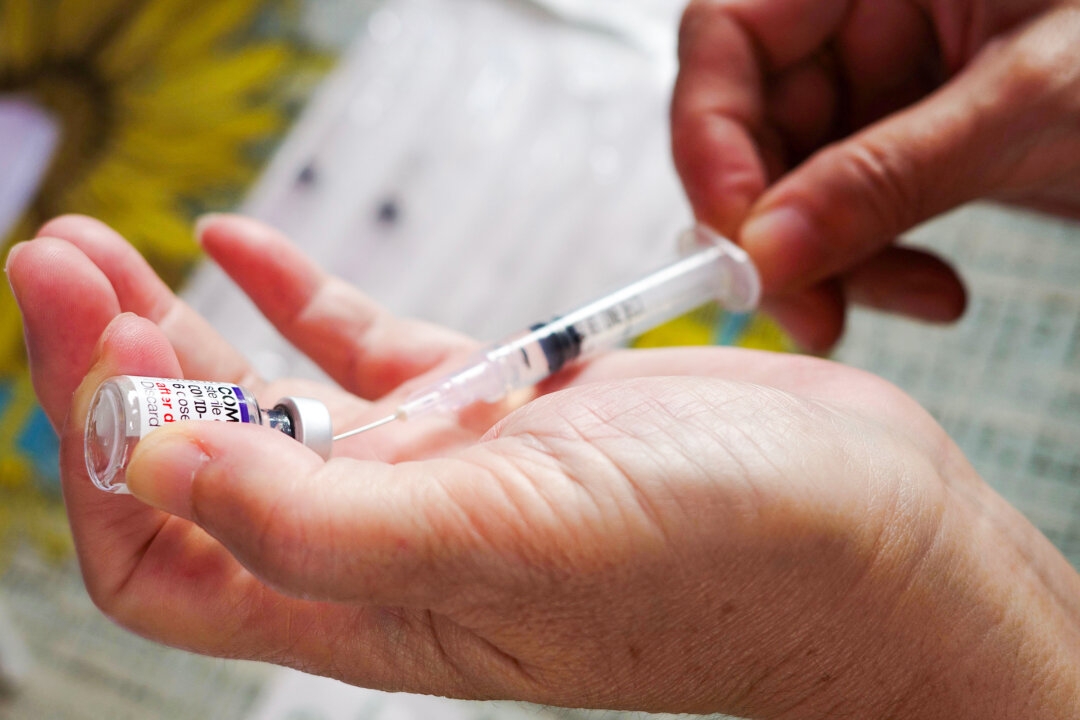A key problem with the clinical trial is that the definition of vaccinated and unvaccinated is unclear, the paper says.

Researchers allege that biases and manipulation of Pfizer and Moderna COVID-19 vaccine clinical data have exaggerated vaccine efficacy and underestimated vaccine adverse events.
While most clinical trials would evaluate the effects of a drug from the day it is administered, these COVID-19 mRNA vaccines are not being evaluated from the first day the vaccines are given. A later date is chosen, which inflates the vaccine’s perceived efficacy and safety, researchers say.
It could make an ineffective vaccine — a COVID vaccine with zero efficacy — have a perceived vaccine effectiveness of up to 48 percent, said researcher Raphael Lataster on Feb. 26, citing a paper authored by professor Peter Doshi from the University of Maryland and others.
Unclear Definitions of Vaccinated vs. Unvaccinated
Mr. Lataster, associate lecturer at the University of Sydney, spoke at Sen. Ron Johnson’s (R-Wis.) Feb. 26 roundtable discussion on COVID-19 vaccines and public health messaging. He summarized findings from a collection of four commentaries published in a peer-reviewed journal, of which two were authored by him.
“We have found in the studies varying definitions of fully vaccinated and unvaccinated. Generally what we find is that they are ignoring COVID infections in the partially vaccinated,” Mr. Lataster said.
“In randomized trials, it is customary to define ‘time zero’ as the point in time, for each trial participant, when eligibility criteria are met, treatment is assigned, and follow‐up begins,” Mr. Doshi and another author wrote in one of the papers.
Instead, COVID cases in vaccinated individuals are only counted weeks after a person is vaccinated. In Pfizer’s clinical trials, a person is considered vaccinated and their COVID cases are counted a week after they received the second dose, whereas in Moderna’s clinical trials, a person is considered vaccinated two weeks after their second dose.
By substituting some of Pfizer’s phase 3 clinical data and defining a person as vaccinated or unvaccinated according to Pfizer’s criteria in the clinical trials, Mr. Doshi and his authors found that Pfizer clinical trial could inflate a vaccine with zero efficacy to 48 percent. Their finding was published in the Journal of Evaluation in Clinical Practice.
Additionally, they found that this hypothetical number could further inflate to 67 percent due to other real-life factors during vaccine rollouts.
As older people were more likely to get vaccinated early on due to being more at risk of infections, this may reduce the perceived vaccine efficacy.
However, people were getting vaccinated at the time when COVID cases were peaking and people were generating natural immunity to the virus. The subsequent decline in COVID cases coincided with increased vaccination rates, which would then inflate perceived vaccine efficacy, according to the paper.
Millions of Lives Saved Based on Modeling
The COVID-19 mRNA vaccines have been promoted to have saved millions of lives. However, Mr. Lataster said that those statements may not reflect what happened in real life.
Mr. Lataster has been invited to partake in a study reviewing whether the mRNA vaccines have saved millions of lives.
“There are many problems we found, over twelve issues with how the data is utilized and estimated. For one thing, it’s [based on] a model and the map is not the territory,” Mr. Lataster said. The study is currently unpublished.
He said that they have also been looking at verifying claims that COVID-19 vaccines reduced severe disease, hospitalizations, and deaths.
One of the problems that has been identified is that most of these studies do not define or have different definitions of what counted as a vaccinated person.
Significant Number of Unconfirmed COVID Cases
According to an FDA briefing document, Pfizer acknowledged “3410 total cases of suspected but unconfirmed COVID‐19 in the overall study population.”
These suspected cases were split almost evenly between the treatment and placebo groups.
The Pfizer vaccines were estimated to have over 90 percent vaccine efficacy because while 850 out of around 22,000 people in the placebo group contracted COVID, only 80 out of 22,000 vaccinated participants contracted COVID. This difference in proportion of COVID cases is how the researchers calculated the vaccine efficacy.
However, if all of the suspected cases were indeed COVID-19 cases, having a similar proportion of COVID-19 cases between the treatment and placebo group “would have drastically brought down treatment efficacy estimates,” Mr. Lataster wrote in his commentary.
“In any case, you can argue that figure is well below the 50 percent required for approval,” Mr. Lataster said.
Underrepresented Adverse Events
While Pfizer and Moderna phase 3 clinical trials followed adverse events from the day of vaccine administration, they defined an individual as vaccinated only if several weeks had passed following vaccination.
Therefore, some of the adverse events that may have occurred soon after vaccination and would therefore be more strongly linked to vaccination would not be attributed to the vaccine, leading to underestimated adverse event rates.
Also, the recording of the adverse events is mostly reliant on unsolicited reporting by vaccine participants, especially for serious adverse events, according to Pfizer’s fact sheet for health providers. If the participant dies following the COVID-19 vaccine, the trial researchers may be unable to track this since they need reporting from the participants, according to Mr. Lataster.
COVID vaccination adverse event reports to the Vaccine Adverse Event Reports System show that more than 12 percent of deaths occurred on the day or the day after vaccination.
Furthermore, the placebo group was later given the COVID-19 vaccines, effectively “unblinding” them. This meant that researchers would be unable to compare the placebo and the vaccine group for potential long-term safety signals.
The Epoch Times reached out to Pfizer and Moderna for comments.
